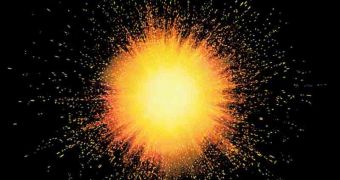The Big Bang is a cosmological model in which the universe has been expanding for around 13.7 billion years, starting from a tremendously dense and hot state, thought to be the best model for the origin and evolution of the universe.
But what happened before the Big Bang? A logical thinking would produce the obvious statement that if nothing happens without a cause, then something must have caused the universe to appear. What exactly is that something? Well...no one really knows.
One of the simplest answers lies in the creationist theory. By simply proclaiming that God created the universe, the matter should be solved. But some people could wonder "where did God come from?" and that would only generate another dead end.
Another theory says the universe didn't have a beginning, that it has existed for all eternity. This doesn't work either, since there is substantial evidence that if all known physical processes are likely to occur with a certain nonzero probability - however small - then given an infinite amount of time the process must occur, with probability one. This means that by now the universe should have reached some sort of final state in which all possible physical processes have run their course.
Maybe we are just asking the wrong question. Maybe the origin of the universe - what we now call the Big Bang - was not simply the sudden appearance of matter in an eternally preexisting void, but the coming into being of time itself.
And if time began with the universe itself, then there was no "before," no vast expanse of time without matter. After all, we perceive time by observing space, matter and energy and their transformations in time, so this could mean that the notion of time may not have existed before the universe.

 14 DAY TRIAL //
14 DAY TRIAL //